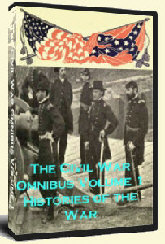The Conspiracy
If all the pieces had fallen into place, it could have changed the political landscape of American history, if not the world. If the plan would have worked, it could have been one of the most complete political coups in history.
While the assassination of Abraham Lincoln is one of the best known events in American history, it was only one part of a larger plan by John Wilkes Booth that has been largely forgotten, a plan to overthrow the United States government and give the defeated Confederacy the opportunity to shore up their resources and possibly win a war that had already for all intents and purposes ended.
Booth’s original plan was not to kill Lincoln, but rather to kidnap him and exchange him for the Confederate prisoners of war that fervent Confederate supporter Booth believed would be important to the continuing Confederate war effort. However, his plans to kidnap Lincoln fell through more than once, and after attending Lincoln’s second inauguration in March of 1865, he realized that killing Lincoln would be even easier than kidnapping him, and he began to formulate a new plan.
The new plan that Booth hatched with his conspirators in the original kidnapping plot, Samuel Arnold, George Atzerodt, David Herold, Michael O’Laughlen, Lewis Powell and John Surratt, would be much more disruptive to the U.S. government. This time, Booth decided that in order to effect any sort of real revolution, others would have to be assassinated as well, and included General Ulysses S. Grant, Vice President Andrew Johnson, and Secretary of State William Seward.
On April 14, 1865, Booth realized that he had the perfect opportunity to do away with President Lincoln and General Grant. He learned that Lincoln and General Grant would be at the Ford Theatre that night, attending a performance of the play Our American Cousin. Lincoln and Grant would be in Booth’s territory; a fairly popular actor himself, Booth was familiar with the layout of the Ford Theatre.
With the ideal conditions for assassinating Lincoln at hand, Booth decided that the best plan of action would be to orchestrate the simultaneous assassinations of Lincoln, Grant, Johnson, and Seward; disposing of all four of these important government figures in one night would create enough disruption in Washington to allow the revival of the Confederacy.
It is almost shocking how little preparation that Booth and his conspirators had before the planned assassinations. With less than four hours to spare, Booth met with his band of infidels and plotted their courses of action. He ordered Powell to kill Seward, At 7 o’clock that night Booth met with his fellow conspirators. Booth assigned Powell to kill Seward and Atzerodt to kill Johnson. Herold, a former apothecary’s assistant who’d delivered to many of the government’s residences in the city, was to take Powell to Seward’s residence, then out of the city to Maryland, where he would meet Booth. All the assassinations were to take place just after 10 p.m.
The details of Lincoln’s assassination are well-known; however, it is worth noting that Grant escaped harm, leaving the city with his wife earlier that day. The other assassination attempts have been neglected by history.
Of the others whom Booth planned to murder, only Seward was actually injured. Powell took advantage of the fact that Seward had been seriously injured in a carriage accident shortly before the attempt on his life, and was bedridden. Posing as a messenger from Seward’s physician, Powell gained entrance into Seward’s home, where he attacked both Seward, stabbing him several times, and Seward’s son. In the melee, he also injured several other members of the Seward household, none seriously. Despite his multiple stab wounds, Seward was not critically injured, nor was his son, Frederick. Powell escaped into the night, screaming “I’m mad, I’m mad!”
Vice-President Andrew Johnson was probably never aware until after the fact that any attempt on his life had been planned. Atzerodt had entertained second thoughts about assassinating Johnson, even telling Booth that he’d only agreed to kidnapping, not murder. Booth insisted to Atzerodt that it was too late to turn back, but with little success; although Atzerodt went to the hotel where Johnson was staying, he got drunk in the hotel bar and changed his mind, discarding the knife he’d been given to complete the deed with.
Booth’s assassination of Lincoln changed the course of American history, but it is almost impossible to imagine what course the country would have taken had all the assassinations that Booth had planned for that night been successful.


